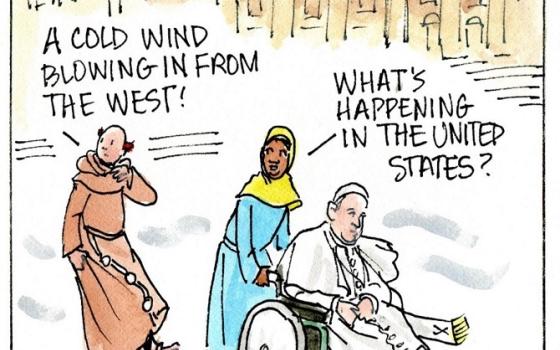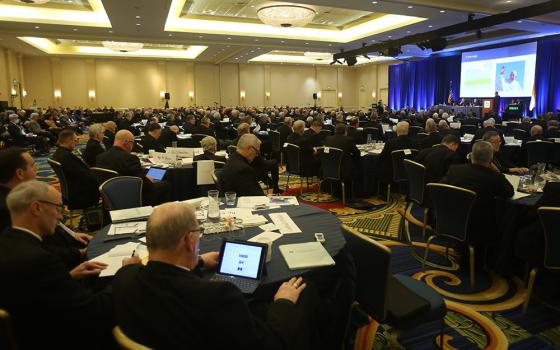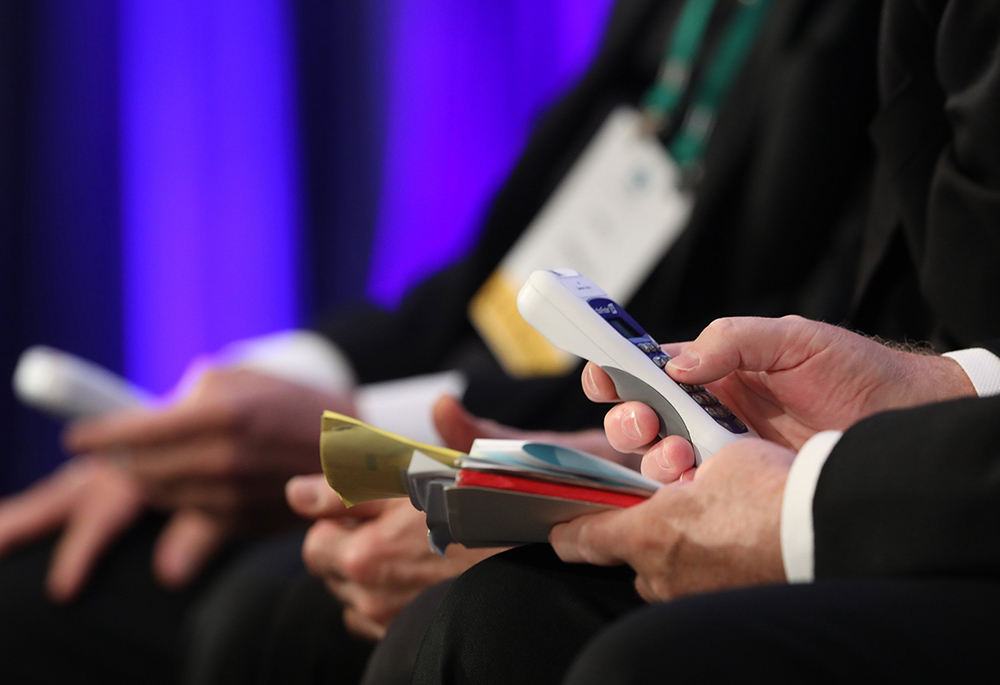
Bishops vote Nov. 12, 2019, during the fall general assembly of the U.S. Conference of Catholic Bishops in Baltimore. The agenda for the Nov. 14-17, 2022, general assembly includes elections for new conference leaders. (CNS/Bob Roller)
This year's plenary meeting of the country's Catholic bishops will probably not garner the same attention it did in 2021, when the prelates were expected to debate whether to deny Communion to pro-choice politicians.
By working out their differences behind closed doors last year, that discussion never exactly materialized and the agenda this time lacks substantive grist for eye-catching headlines. But the prelates' Nov. 14-17 gathering in Baltimore will still mark notable milestones and important turning points for the Catholic Church in the United States.
"I think a way to assess the coming bishops' meeting is whether they showcase the divisions of two years ago or the search for common ground of a year ago. That will be a real test for them as pastors and leaders," said John Carr, a former bishops' conference official who founded and co-directs the Initiative on Catholic Social Thought and Public Life at Georgetown University.
The bishops will elect a new conference president and vice president. Archbishops José Gomez of Los Angeles and Allen Vigneron of Detroit are ending their terms as president and vice president, respectively, after a turbulent three-year tenure in which deep and bitter divisions among the bishops broke out into the open amid the November 2020 election of President Joseph Biden, a Catholic Democrat who supports abortion rights.
"I never thought of Gomez as somebody who wanted to be confrontational, but the politics of the bishops' conference kind of pushed him in that direction," said Jesuit Fr. Tom Reese, a journalist who has covered the bishops for decades.
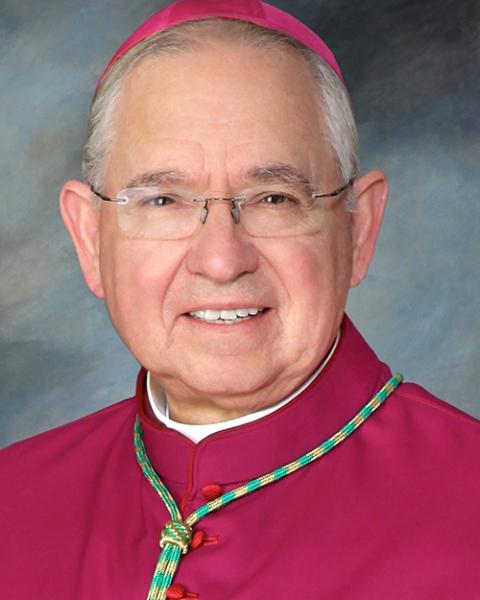
Archbishop José Gomez of Los Angeles, president of the U.S. Conference of Catholic Bishops, is seen in this Nov. 20, 2019, file photo. (CNS/Courtesy of the Archdiocese of Los Angeles)
As the conference president, Gomez delivered a dour congratulatory statement after Biden's election in November 2020, where the archbishop criticized the president-elect for his stance on abortion, and announced that he was appointing a special working group to examine the "difficult and complex situation."
In 2021, Gomez angered Black Catholics in the United States when he delivered a speech to a Catholic group in Spain where he denigrated modern social justice movements like Black Lives Matter as Marxist-inspired, anti-Christian "pseudo-religions."
Gomez is expected to deliver his final speech as bishops' conference president during the first of two public general sessions on Nov. 15.
Nichole Flores, a religious studies professor at the University of Virginia who studies the relationship between Catholicism and democracy, told NCR that Gomez had helped lead the U.S. church in the direction of "shutting down conversations before they even began."
"I've been really concerned by how he hasn't shown up to the task of responding to the divisiveness within the church, especially in regards to his participation in secular politics," said Flores, who added that she saw Gomez as "a very promising leader" growing up in the Archdiocese of Denver, where Gomez was an auxiliary bishop before being appointed to Los Angeles.
"The response to the election of the second Catholic president in the history of the United States really deserved more nuance than a campaign to deny him Communion," said Flores. "I think there is a missed opportunity for real conversation about not just what it means to be a Catholic in public life, but what it means to be pro-life."
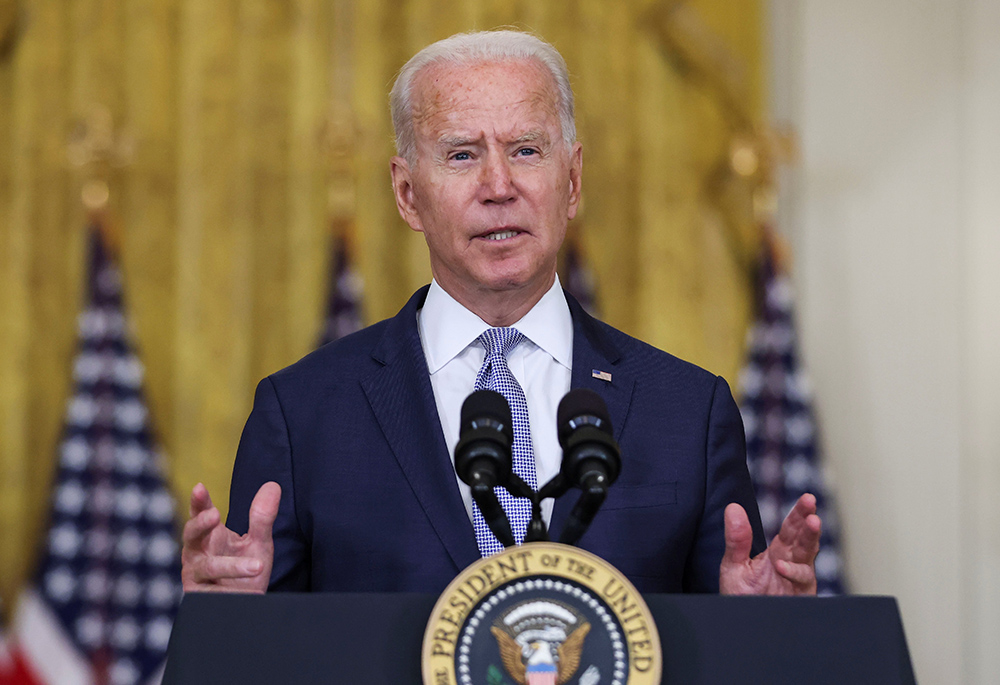
President Joe Biden discusses his "Build Back Better" agenda and his administration's efforts to lower prescription drug prices from the White House Aug. 12, 2021, in Washington. (CNS/Reuters/Evelyn Hockstein)
Stephen Schneck, a commissioner for the U.S. Commission on International Religious Freedom, told NCR that he personally admires Gomez and had high hopes when the Mexican-born bishop was elected the conference president in November 2019.
"But in fact, I think he struggled as president, and he'd probably be the first one to say that," Schneck said. "He really seemed to have a hard time keeping divisions among the bishops from breaking out in public."
The bishops' gathering will also be their first collective public meeting since the U.S. Supreme Court on June 24 struck down Roe v. Wade, the landmark abortion ruling that the bishops worked nearly five decades to overturn. They are expected to discuss their ideas for supporting women and families.
"I think we're going to get a better picture of what the position of the bishops is on abortion issues post-Dobbs," Reese said, referring to the high court's new landmark abortion decision in Dobbs v. Jackson Women's Health Organization.
Cathleen Kaveny, a theology and law professor at Boston College and Boston College Law School, told NCR that she thinks the bishops need to pivot from the way they have discussed abortion and reassert their independence from political parties.
"I think what they need to think about is not simply, 'How do we keep outlawing more abortions?' but really, 'How do we reframe this?' " Kaveny said. "And they need to mean it, not just to say it."
Advertisement
In addition to discussing post-Roe America, the bishops will review "Forming Consciences for Faithful Citizenship," the conference's quadrennial document for Catholic voters that some observers say needs to be revamped to reflect new threats facing American democracy.
"I think it's indisputable that the challenge now is the continuation of our democratic republic," said Kaveny, who added that "it's definitely time for a rewrite" of "Faithful Citizenship," which was last updated substantially in 2007.
Schneck also said the document "needs a real rewrite to bring it up to speed" so as to include the insights that Pope Benedict XVI wrote in his 2009 encyclical Caritas in Veritate and that Pope Francis emphasized in his encyclicals "Laudato Si', on Care for Our Common Home" in 2015 and Fratelli Tutti in 2020.
However, Russell Shaw, a Catholic writer who previously served as the public affairs secretary of the bishops' conference, told NCR that he doubts any significant changes will be made to "Faithful Citizenship."
"I assume what the bishops want to do at this meeting is agree on a way of proceeding that will avoid the embarrassing public hassle that occurred over wording in the previous version and head off the sort of controversy that focused on the [bishops'] statement at the time of Biden's inauguration," Shaw said.
The bishops at the meeting will also hear updates on the conference's $28 million eucharistic revival project that initially grew out of a failed effort to censure Biden and other pro-choice Catholic politicians. They are also expected to have a discussion on the 2023-2024 Synod of Bishops on synodality, which Pope Francis has set as a priority for the universal church.
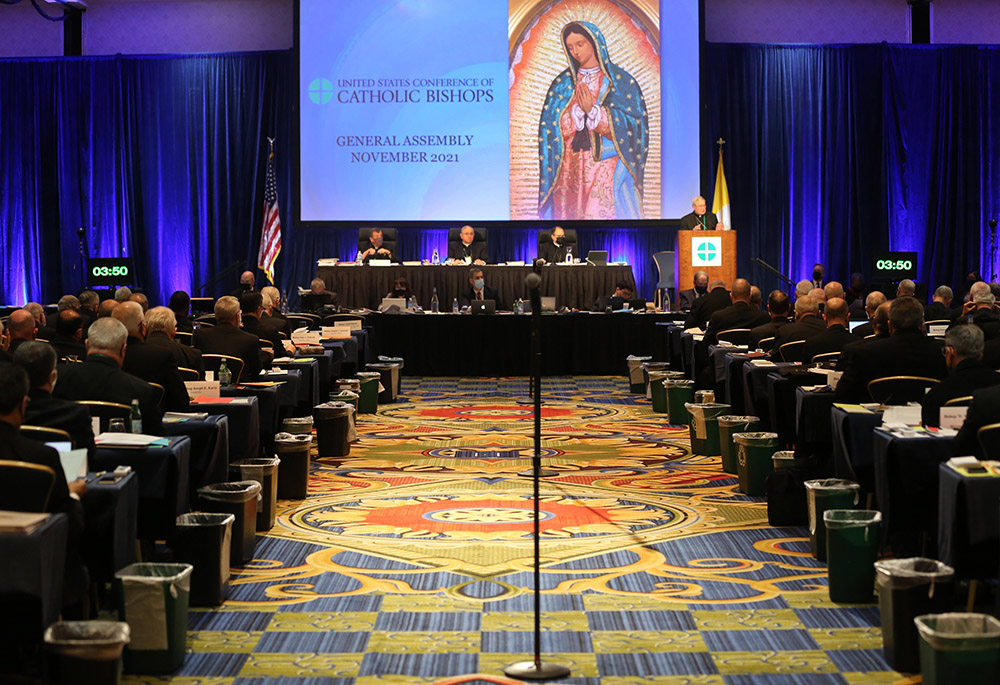
Bishops attend a Nov. 16, 2021, session of the fall general assembly of the U.S. Conference of Catholic Bishops in Baltimore. The bishops' 2022 general assembly will be held Nov. 14-17. (CNS/Bob Roller)
And two decades since the Boston Globe exposed the scope of the clergy sex abuse crisis in the Boston Archdiocese, the bishops will acknowledge the 20th anniversary of the "Charter for the Protection of Children and Young People," a document commonly known as the Dallas Charter, that established new norms and policies in the United States to investigate sex abuse allegations in church settings.
"It would not be particularly helpful if the bishops simply say the Dallas Charter has worked well and they intend to remain eternally vigilant," said Shaw, who told NCR in an email that "there are two big questions on the table right now" regarding the charter.
"One, reflected in the recent national survey of priests, is the mistrust of their bishops felt by priests who fear their bishop will simply throw them under the bus on the basis of an unproven, untrue allegation. The other is how well the mechanism of episcopal collegiality is working," Shaw said.
Regarding elections for the new president and vice president, as well as for the selection of chairmen for six of the bishops' standing committees, Shaw suggested the outcomes will depend largely "on how activist" the candidates choose to be.
"And since the candidates don't announce their platforms before the election takes place, there is no reliable way of knowing that in advance," Shaw said.
Strong personalities in leadership race
For president and vice president, positions that carry three-year terms, the bishops will choose from a slate of ten candidates. The top vote-getter is elected president; the vice president is selected from the remaining candidates.
This year's candidate slate includes no cardinals, which Reese suggested shows a lack of interest on their part to lead the conference.
"I'm willing to bet they were nominated, but they said, 'No thank you,' so the next person on the list got put up," Reese told NCR.
A prelate in a red zucchetto may not lead the conference anytime soon, but this year's slate includes a few high-profile names, some with strong personalities that could take the conference in particular directions if elected.
"The president of USCCB can do a lot behind the scenes to move the organization in one way or another, or he can just lay back and let the conference machinery operate without his getting overly involved," Shaw said.
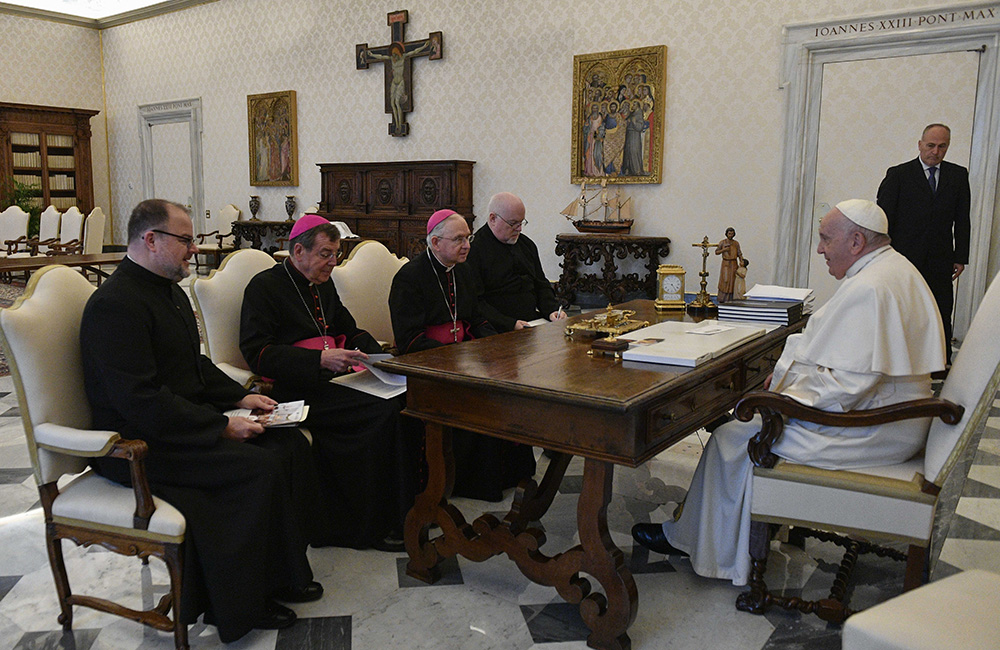
Pope Francis meets with the leadership of the U.S. Conference of Catholic Bishops in the library of the Apostolic Palace Oct. 13 at the Vatican. Pictured with the pontiff are Fr. Michael Fuller, general secretary; Detroit Archbishop Allen Vigneron, vice president; Archbishop José Gomez of Los Angeles, president; and Fr. Paul Hartmann, associate general secretary. (CNS/Vatican Media)
More conservative candidates include San Francisco Archbishop Salvatore Cordileone, who has been outspoken in his opposition to LGBTQ rights and supports denying Communion to pro-choice politicians. Cordileone has notably clashed with House Speaker Nancy Pelosi, a Catholic Democrat from San Francisco whom Cordileone has banned from receiving Communion in his archdiocese.
Another candidate seen as to the right of center is Archbishop Timothy Broglio of the U.S. Archdiocese for the Military Services. As a monsignor, Broglio served as private secretary for the late Cardinal Angelo Sodano, the Vatican secretary of state under Pope John Paul II who shielded then-Fr. Marcial Maciel Degollado, the serial sexual abuser and founder of the Legionaries of Christ.
In 2018, Broglio supported a U.S. Air Force chaplain who in a homily blamed "effeminate" gay priests for clergy sex abuse. In an emailed response to a woman who complained about the priest's homily, Broglio said there was "no question that the crisis of sexual abuse by priests in the USA is directly related to homosexuality." A 2011 John Jay College of Criminal Justice report on the causes and contexts of clergy sex abuse found no statistical evidence to back that claim, which is popular among conservative Catholics.
With the exception of Seattle Archbishop Paul Etienne, who is seen as a relatively progressive bishop in the mold of Francis, and perhaps Bishop Gustavo García-Siller of San Antonio, most of the remaining candidates could be described as moderate or center-right prelates.
The most notable names there include Baltimore Archbishop William Lori, who serves as chairman of the conference's Committee on Pro-Life Activities; Fort Wayne-South Bend, Indiana Bishop Kevin Rhoades, who led the Committee on Doctrine that drafted the compromise Communion document in 2021; Oklahoma City Archbishop Paul Coakley, chairman of the Committee on Domestic Justice and Human Development; and Brownsville, Texas Bishop Daniel Flores, the current head of the doctrine committee.
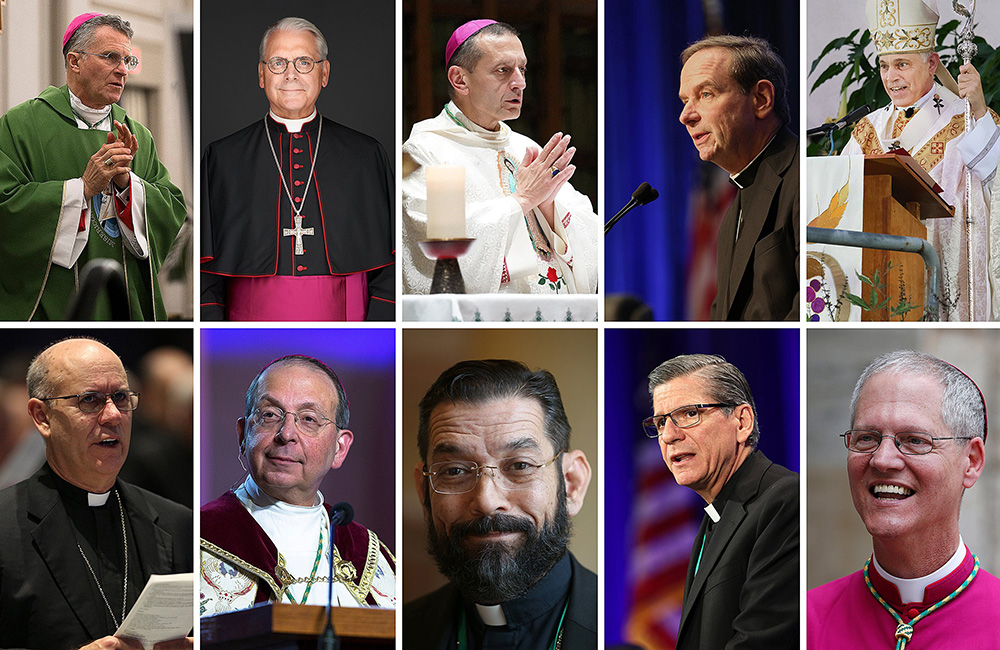
Candidates for the upcoming 2022 U.S. bishops' conference presidential and vice presidential elections are shown clockwise from top left: Archbishop Timothy Broglio of the U.S. Archdiocese for the Military Services; Archbishop Paul Coakley of Oklahoma City; Bishop Frank Caggiano of Bridgeport, Connecticut; Bishop Michael Burbidge of Arlington, Virginia; San Francisco Archbishop Salvatore Cordileone; Seattle Archbishop Paul Etienne; Archbishop Gustavo García-Siller of San Antonio; Bishop Daniel Flores of Brownsville, Texas; Baltimore Archbishop William Lori; and Bishop Kevin Rhoades of Fort Wayne-South Bend, Indiana. (CNS composite/Photos by Tyler Orsburn; Archdiocese of Oklahoma City; Gregory A. Shemitz; Bob Roller; Dennis Callahan, Catholic San Francisco; Paul Haring; Bob Roller; Bob Roller; Tyler Orsburn; and Bob Roller)
Among those candidates, Flores' name elicits the most interest from outside observers who note his outspokenness on issues such as migration and gun control. Flores was also the American bishop who guided the recent synodal listening process in the United States, which released a comprehensive report in August.
"He has one of the finest minds in this generation of bishops," Schneck said.
Massimo Faggioli, a theologian and church historian at Villanova University, told NCR that Flores' candidacy and the votes he gets may determine how popular, or unpopular, the synod is among the bishops.
Conservative Catholics, including some church leaders, have complained that the synod's open style of dialogue and frank acknowledgment of disagreements about issues such as women's ordination and LGBTQ rights threatens to undermine church teachings.
"I read this [election of USCCB officers] through the lens of the synodal process," Faggioli said.
Noting the recent history of tensions between the Vatican and the bishops' conference, Kaveny, of Boston College, said she hopes for the election of bishops who are less ideological.
"I would like to see a more moderate slate that is at least willing to work with [Pope Francis], especially on issues that are so important to younger people, like the economy which is so important to everybody at this point, but also the environment and gun violence," Kaveny said.




